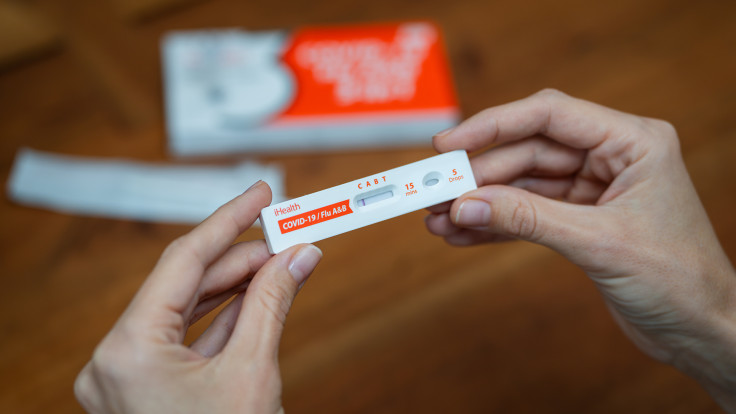
As families and friends prepare to visit loved ones, enjoy vacations or attend festive gatherings for the holidays, heightened exposure to respiratory viruses like influenza A, B and COVID-19 pose particular risks during the colder months, when people gather indoors more frequently. Incorporating regular antigen testing into your routine is an effective and responsible approach to help protect your family and others.
Risks of Travel-Related Infections
Close contact with travelers in airports, train stations, buses, and other crowded spaces also increases the likelihood of spreading viruses and the chances of encountering someone who may be contagious.
For families traveling with young children or older adults, the risk is amplified, as both groups are more susceptible to complications from respiratory illnesses and can spread a virus to others before realizing they are sick. Early detection allows individuals to make informed decisions about whether to continue their travel plans, isolate themselves, or seek further medical care.
Similar Symptoms, Different Impacts
The flu and COVID-19 are respiratory illnesses and their symptoms can overlap. This makes it challenging to differentiate between them based solely on how you feel. Common symptoms include fever or chills, cough, fatigue, sore throat, body aches or muscle pain, headache, shortness of breath and/or runny or stuffy nose (congestion).
COVID-19 has shown to be more severe. Complications like pneumonia, respiratory failure, and acute respiratory distress syndrome (ARDS) are more commonly associated with COVID-19, particularly in high-risk individuals, such as those over the age of 65, or those with preexisting conditions like heart disease, diabetes, or asthma.
Influenza A tends to cause more severe outbreaks and is usually responsible for flu pandemics. It can mutate quickly, making it more unpredictable, which is why it's often the virus behind the widespread flu outbreaks we hear about each year.
Influenza B, on the other hand, tends to be milder and more consistent, but it can still cause significant illness, especially for children under five years of age. Their immune systems are still developing, making them more susceptible to severe symptoms and complications like pneumonia, ear infections or sinus infections.
How Antigen Testing Helps
Antigen tests, like iHealth's COVID-19/Flu A&B 3-in-1 Rapid Test, are designed to detect specific proteins found on the surface of viruses like influenza and COVID-19. They offer a rapid and accessible way to determine whether a person is infected with a virus, allowing individuals to take preventative measures such as isolating, delaying travel, or wearing masks.
These tests are widely accessible, cost-effective and easy to use, making them ideal for just about anyone. Unlike PCR tests, which can take between 24 to 48 hours to return results, antigen tests typically provide answers within 15 minutes.
Practical Steps for Testing During Your Holiday Routine
Incorporating antigen testing into your holiday travel plans is easy and helps protect your family and the communities you'll be visiting. Here are some practical steps to follow:
Test before you travel. Whether you're flying, driving, or taking public transportation, consider testing yourself for both influenza and COVID-19 a day or two before you depart. This ensures that you aren't unknowingly carrying a virus to your destination.
Pack test kits for your trip. Bring antigen tests with you while traveling so you can test as needed. These kits are small, portable and easy to use, making them ideal for testing while on the go. If you develop symptoms during your trip or are exposed to someone who is sick, you'll have a quick way to check your status.
Test before gatherings. If you're planning to visit vulnerable family members, such as older adults or immunocompromised individuals, test for both flu and COVID-19. This can prevent spreading serious illness among your loved ones.
Stay aware of symptoms. Even if your test is negative, stay mindful of any symptoms you or your family members may develop. If you start experiencing symptoms like a fever, cough or body aches, consider testing again or seeking medical advice.
Stay vigilant post-travel. After returning from your holiday trip, it's wise to test yourself, especially if you were in crowded places or had close contact with many people. If you experience any symptoms such as a cough, fever or fatigue, test immediately to prevent spreading the illness to others.
Staying Safe and Protecting Others
Holiday travel is a time for families to come together and create lasting memories. However, it's important to prioritize safety, especially when protecting against viruses like influenza A, B, and COVID-19. Regular antigen testing offers a quick, affordable and reliable way to ensure your family remains healthy during your travels. By incorporating testing into your holiday plans, you can minimize the risk of spreading illness, protect vulnerable loved ones and enjoy a more peaceful, worry-free holiday season.
About the author:
Binit Shah is a content writer and senior marketing specialist for iHealth Labs. With over a decade of experience in writing about healthcare and science industries, he aims to make complex issues accessible to readers. Binit enjoys exploring the intersection of human interests and technology.







